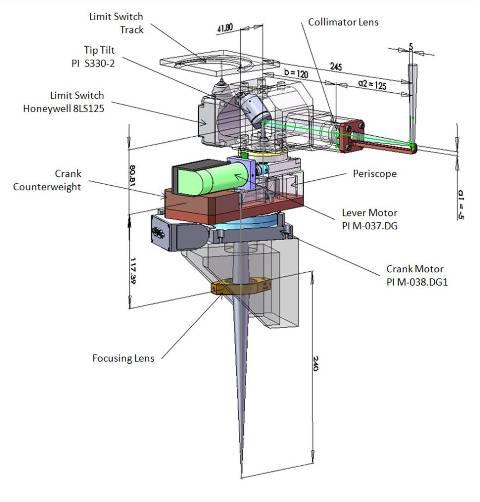|
نویسنده : www.BartarFile.ir
|

|
جزوه آموزش طراحی مکانیزم ها (Mechanism Design) دانشگاه کالیفرنیا آمریکا، یک جزوه جامع و کم نظیر از آموزش طراحی مکانیزم ها می باشد. الگوی آموزشی این جزوه مبتنی بر آموزش با توضیحات کامل به همراه مثال های کاربردی و مفهومی و محاسبات مربوطه می باشد. این جزوه مشتمل بر 322 صفحه، در 11 فصل، به زبان انگلیسی روان و به همراه تصاویر و روابط ریاضی، به ترتیب زیر گردآوری شده است:

Mechanism Design - Enumeration of Kinematic Structures According to Function - Booklets
Chapter 1: Introduction
Introduction
A Systematic Design Methodology
Links and Joints
Kinematic Chains, Mechanisms, and Machines
Kinematics of Mechanisms
Planar, Spherical, and Spatial Mechanisms
Kinematic Inversions
Summary
References
Chapter 2: Basic Concepts of Graph Theory
Degree of a Vertex
Walks and Circuits
Connected Graphs, Subgraphs, and Components
Articulation Points, Bridges, and Blocks
Parallel Edges, Slings, and Multigraphs
Directed Graph and Rooted Graph
Complete Graph and Bipartite
Graph Isomorphisms
Tree
Planar Graph
Spanning Trees and Fundamental Circuits
Euler’s Equation
Topological Characteristics of Planar Graphs
Matrix Representations of Graph
Adjacency Matrix
Incidence Matrix
Circuit Matrix
Path Matrix
Contracted Graphs
Dual Graphs
Summary
References
Exercises
Chapter 3: Structural Representations of Mechanisms
Introduction
Functional Schematic Representation
Structural Representation
Graph Representation
Advantages of Using Graph Representation
Matrix Representation
Adjacency Matrix
Incidence Matrix
Summary
References
Exercises
Chapter 4: Structural Analysis of Mechanisms
Introduction
Correspondence Between Mechanisms and Graphs
Degrees of Freedom
Loop Mobility Criterion
Lower and Upper Bounds on the Number of Joints on a Link
Link Assortments
Partition of Binary Link Chains
Structural Isomorphism
Permutation Group and Group of Automorphisms
Group
Group of Automorphisms
Identification of Structural Isomorphism
Identification by Classification
Identification by Characteristic Polynomial
Optimum Code
Degree Code
Partially Locked Kinematic Chains
Summary
References
Exercises
Chapter 5: Enumeration of Graphs of Kinematic Chains
Introduction
Enumeration of Contracted Graphs
Enumeration of Conventional Graphs
Atlas of Graphs of Kinematic Chains
Summary
References
Exercises
Chapter 6: Classification of Mechanisms
Introduction
Planar Mechanisms
Planar Linkages
Planar Geared Mechanisms
Planar Cam Mechanisms
Spherical Mechanisms
Spatial Mechanisms
Spatial One-dof Mechanisms
Spatial Multi-dof, Multiple-Loop Mechanisms
Summary
References
Exercises
Chapter 7: Epicyclic Gear Trains
Introduction
Structural Characteristics
Buchsbaum–Freudenstein Method
Genetic Graph Approach
Parent Bar Linkage Method
Mechanism Pseudoisomorphisms
Atlas of Epicyclic Gear Trains
One-dof Epicyclic Gear Trains
Two-dof Epicyclic Gear Trains
Three-dof Epicyclic Gear Trains
Kinematics of Epicyclic Gear Trains
Fundamental Circuit Equations
Examples and Summary
References
Exercises
Chapter 8: Automotive Mechanisms
Introduction
Variable-Stroke Engine Mechanisms
Functional Requirements
Structural Characteristics
Enumeration of VS-Engine Mechanisms
Constant-Velocity Shaft Couplings
Functional Requirement
Structural Characteristics
Enumeration of C-V Shaft Couplings
Automatic Transmission Mechanisms
Functional Requirements
Structural Characteristics
Enumeration of Epicyclic Gear Mechanisms
Canonical Graph Representation of EGMs
Structural Characteristics of Canonical Graphs
Enumeration of Canonical Graphs
Identification of Fundamental Circuits
Detection of Transfer Vertices
Atlas of Epicyclic Gear Transmission Mechanisms
Summary
References
Exercises
Chapter 9: Robotic Mechanisms
Introduction
Parallel Manipulators
Functional Requirements
Structural Characteristics
Enumeration of Planar Parallel Manipulators
Enumeration of Spherical Parallel Manipulators
Enumeration of Spatial Parallel Manipulators
Robotic Wrist Mechanisms
Functional Requirements
Structural Characteristics
Enumeration of Three-dof Wrist Mechanisms
Summary
References
Exercises
Chapter 10: Solving m Linear Equations in n Unknowns
Solving One Equation in n Unknowns
Solving m Equations in n Unknowns
References
Chapter 11: Atlas
Atlas of Contracted Graphs
Atlas of Graphs of Kinematic Chains
Atlas of Planar Bar Linkages
Atlas of Spatial One-dof Kinematic Chains
Atlas of Epicyclic Gear Trains
Atlas of Epicyclic Gear Transmission Mechanisms

جزوه با فرمت PDF بوده و به راحتی بر روی گوشی های اندروید و کامپیوتر قابل استفاده می باشد.
جهت دانلود جزوه کم نظیر آموزش طراحی مکانیزم ها (Mechanism Design) دانشگاه کالیفرنیا آمریکا بر لینک زیر کلیک نمایید:
جزوه آموزش طراحی مکانیزم ها (Mechanism Design) دانشگاه کالیفرنیا آمریکا
نظرات شما عزیزان:
:: موضوعات مرتبط: کلیه گرایش ها، ،



 آمار
وبلاگ:
آمار
وبلاگ: